- Font size: Larger Smaller
- Hits: 7098
- 0 Comments
- Subscribe to this entry
- Bookmark
What You Need To Know About Travel Insurance When Cruising !
What You Need To Know About Travel Insurance When Cruising!
With the ever increasing rise of cruising in the Australian market, SureSave is passionate about ensuring all agents are well equipped to inform customers on the best travel insurance options to meet their needs.
Recently Australian Cruising News were able to sit down with Matt Endycott, Head Of Agency Sales At Suresave and ask him some of the questions that need to be answered when it comes to travel insurance and cruising.

Matt Endycott, Head of Agency Sales at SureSave, says,
“An increasing number of Australian travellers are either regular cruisers, or are considering a cruise for their next holiday. Travellers look to their agent for all sorts of cruising options, from booking the right type of cruise for them, through to the most suitable travel insurance policy. It’s essential that agents explain the importance of travel insurance, and its benefits in real-life cruise scenarios, to ensure customers are adequately protected against the unexpected.”
The majority of SureSave’s cruise claims (78.4%) relate to medical expenses. These claims range from relatively minor and common cases, including motion sickness and minor slips, to more serious conditions requiring further medical treatment. Luggage claims account for 13.4% of cruise claims, usually relating to lost property such as sunglasses and prescription glasses, and for damaged goods such as phones and cameras. In addition, the remaining claims consist of 6.7% for cancellation and 1.5% for delayed or missed transport.
Understanding travel insurance for domestic cruises.
“It’s important for travellers to choose a policy that provides an appropriate level of cover. One of the most common causes for confusion is medical cover on a cruise between Australian ports,” says Endycott.
While a domestic policy can provide cover for a range of other, non-medical expenses, an international policy can additionally offer cover for medical expenses incurred on board a cruise ship outside of Australian waters or overseas.
Although travellers might be cruising in Australian waters, once off-shore, they may not be covered by Medicare, leaving them to foot the bill if they’re uninsured. This is also true regardless of whether the cruise provider is an Australian company, or a foreign company.
This is because cruise ships often employ international doctors who may not be registered to practice in Australia, so any on-board treatment provided by them doesn’t meet the criteria for Medicare cover. To be sure, it’s worth contacting the cruise provider to confirm whether Medicare covers treatment on board their ship.
Medical treatment costs when cruising can quickly run into the thousands.
Whilst the average cruise claim is around $800, expenses can run into the thousands, or even hundreds of thousands of dollars, depending on the level of treatment required. One of the most expensive cruise claims we’ve seen came to over $270,000 which included transport from the cruise ship to a hospital at the nearest port, two months of hospitalisation and medical expenses for treatment overseas, then repatriation home with medical escorts.
Getting to a hospital from the middle of the ocean is a challenge.
If a traveller needs urgent medical treatment that can’t be provided on board the ship, it can be tricky to get them to the nearest medical facility from the middle of the ocean. Emergency helicopter evacuations and treatment at a foreign hospital tends to be very expensive and can put travellers out of pocket quickly if they don’t have travel insurance.
Cancellation cover: timing is everything.
Purchasing travel insurance at the same time as booking a cruise could protect travellers should they need to cancel a cruise prior to their departure, or should they need to cut their trip short.
“If travellers have to cancel their cruise at any time in the lead up to their holiday, there’s a chance they could be out of pocket for part or all of their pre-paid booking if they’re not insured. Cruises can be expensive holidays, so it’s worth taking the time to organise cover early,” added Endycott.
However, cancellation claims don’t just happen pre-trip. If a traveller has to cut their trip short, potentially missing out on pre-paid tours or shore excursions, then travel insurance could help recover some of these losses too.
“We had one cruise traveller fall ill during the early days of a back-to-back cruise holiday. He received medical advice not to travel for at least a month, meaning that he and his companion had to cut their trip short. Thankfully, we were able to cover his medical expenses on the ship, as well as the $19,000 in costs to cancel the rest of the trip.”
Additional benefits.
SureSave’s international policy can also cover a broad range of events that apply to cruising including:
• Flight delays and getting to your cruise on time;
• A cruise line becomes Insolvent;
• A cruise is delayed from leaving due to mechanical problems;
• Formal wear is lost, stolen or damaged;
• Policy holder is made redundant prior to embarking on a cruise;
• Missing a shore excursion due to a cruise delay; and
• Medical evacuation from a ship.
“The value of travel insurance is not only financial; it’s about the reassurance of having a support team on hand at all times. Our Sydney-based emergency assistance team, WE Assist, has been involved in multiple cruising claims, liaising with on the ground services, navigating language barriers, coordinating transport and ensuring treatment facilities meet our standards of care,” said Endycott.
This is a brief summary of cover only and does not include full terms, conditions, limitations and exclusions. For more information on SureSave, please visit https://www.suresave.com.au/.
Information supplied by: Suresave and www.australiancruisingnews.com.au The HOME Of Australian Cruising!
© 2024 by Australian Cruising News
Website by Y Media

